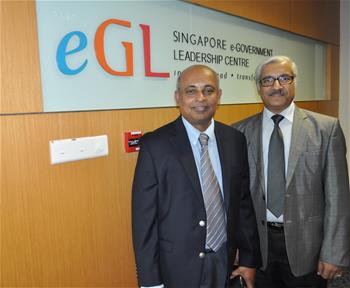An MOU between India’s National Institute for Smart Government and Singapore e-Government Leadership Centre will strengthen the development of e-Government services across India.
The formalisation of a National e-Governance Plan (NeGP) in 2006 has shifted the focal point of India’s e-Government objectives from the computerisation of government departments to the creation of e-platforms that encapsulate citizen centricity, service orientation and transparency.
Supporting the NeGP and taking the lead on public-private partnerships is India’s National Institute for Smart Government (NISG), who is also responsible for e-Government capacity building at national, state and local levels.
Cementing a new milestone
To achieve its purpose, NISG has partnered with the Singapore e-Government Leadership Centre (eGL) through a Memorandum of Understanding (MOU) facilitating collaboration in the areas of education, consulting and research. The MOU was signed on 4 February 2013.
As part of the knowledge sharing, eGL will provide consultancy on e-Government systems and processes; and equip senior officials and civil servants with competencies and international best practices on e-Government strategies and technology adoption.
To date, eGL and NISG have jointly organised three study trips to Singapore for e-Governance champions, from India’s Law Enforcement Departments, as well as Education and Health sectors.
Over the last six months, some 70 delegates from the three government sectors have been trained on Singapore’s e-Government accomplishments, change management & approach to integrated, Whole-Of-Government transformation initiatives. The sector-based training programmes have also included visits to educational institutions, hospitals, relevant government departments and InfoComm Technologies (ICT) service providers, allowing delegates to learn first-hand the challenges and possibilities involved in e-service implementation.
Finding the right match
Dr Piyush Gupta, NISG’s Associate Vice President (Capacity Building and Knowledge Management) told Systems Catalyst that Singapore had been the preferred training destination given its Asian culture, proximity to India, and enviable position on the United Nation’s E-Government Development Index, a measure of ICT usage in public services.
“Singapore is well-recognised as a world leader in the establishment of e-Government frameworks and services. NISG is very pleased to partner with an esteemed institution such as eGL, Institute of Systems Science at the National University of Singapore, and to have come this far in knowledge sharing with eGL within such a short time,” Dr Gupta expressed.

Dr Piyush Gupta, NISG’s Associate Vice President (Capacity Building and Knowledge Management) (right) and eGL’s Centre Director, Mr Ashok Kumar
It had been a bonus for NISG that eGL’s Centre Director, Mr Ashok Kumar, is familiar with the South Asia region. “With his clarity of India’s complex government infrastructure, Ashok has been instrumental to fine-tuning our training agenda. That has enabled us to ‘click’ into action quickly,” Dr Gupta added.
Achieving clear outcomes
Dr Gupta revealed that the study trips have enabled the respective sector champions to document valuable case studies – both success stories and lessons learnt – as a basis for further research and improvements. “The experiences have been enlightening. Key takeaways in education, for example, have included Singapore’s ‘Classroom of the Future’, while the CIOs from our healthcare departments were impressed with the degree of applied ICT in integrated patient care.”
Additional study trips and faculty exchange programmes are certainly in the pipeline, given the enthusiastic response and ownership of e-initiatives that each government department is expected to take.
India’s private sector too, has been passionate with its support. “With large numbers of precincts still inaccessible by road, the e-Government potential in India is huge,” Dr Gupta remarked. “Building up the IT infrastructure, data centre and an e-Government portal for each State would be imperative, and our plan is to establish e-connectivity with the 3.5 lakhs panchayats (or villages) across India.”
Clearly, it is a vision that would involve extensive knowledge and change management, but the obvious pay-offs from improved public service, higher work efficiencies and resource savings will keep NISG and its network of government agencies going.
Setting the stage for future collaboration
When asked what the future plans between eGL and NISG were, Mr Ashok Kumar disclosed that both parties have developed a strong working relationship under Dr. Gupta’s visionary leadership and are keen to explore programmes on e-Government capacity building. “There’s certainly scope for a global curricula on e-Government education in collaboration with NISG to create differentiation and value for participants.
“Given our global experience and exposure, I strongly believe that eGL can provide a stimulating learning environment and contribute to the intellectual capital on e-Government leadership,” Ashok added.
This article is first published in NUS-ISS quarterly e-newsletter, Issue 4 (Oct-Dec 2013).